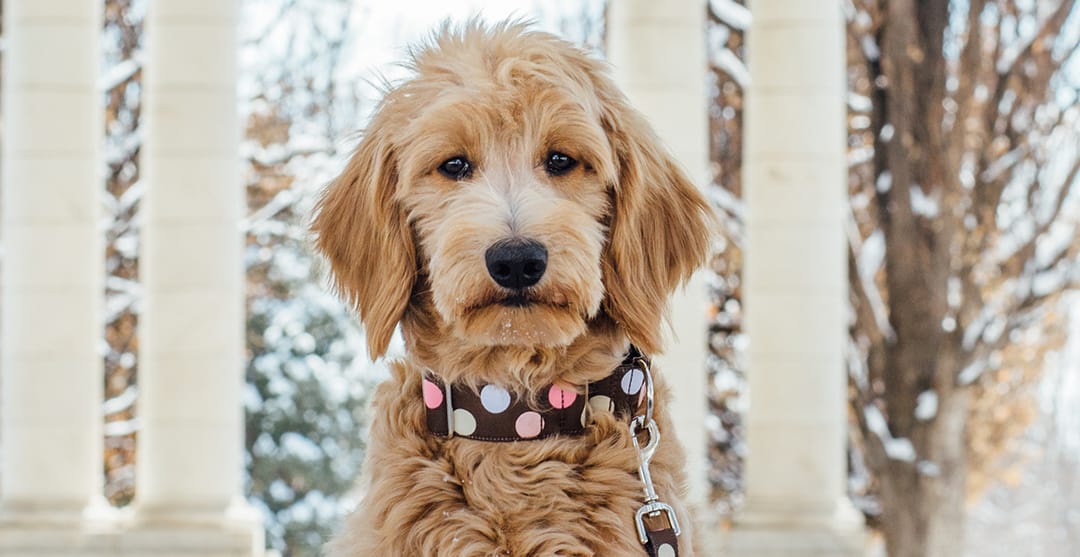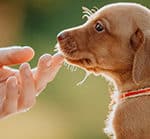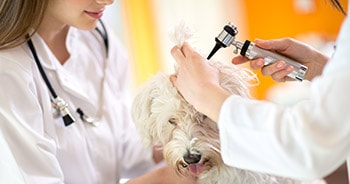Originating in the 1990s, the Goldendoodle is a hybrid dog breed that’s gained a lot of popularity the past couple decades.
What started as a mixed breed dog few people knew quickly developed into a dog breed that almost became a household name overnight.
The Goldendoodle was created by mixing a Golden Retriever and a Poodle.
The main purpose for breeding the Goldendoodle was to develop a larger alternative to the Cockapoo, a mixture of Cocker Spaniel and Poodle.
Dog owners loved the Cockapoo but wanted a larger dog with some of the same wonderful qualities and believed the Goldendoodle would make a wonderful dog and family pet.
The goal was to have a dog that possessed the Poodle’s intelligence and hypoallergenic qualities with the Golden Retriever’s temperament and laid-back personality.
Another goal was to create hybrid vigor and improve the health of the litter by eliminating some of the health issues found in both dogs and create a healthier dog breed.
But, do Goldendoodles still have health issues? Goldendoodles are a relatively healthy breed with a long life span. By mixing these two breeds, they were able to decrease the chance of the puppies being prone to certain breed-related diseases and health issues. However, they are still susceptible to many of the same conditions that Golden Retrievers and Poodles are. These might include:
- Atopic Dermatitis
- Epilepsy
- Cranial Cruciate Ligament Rupture
- Patellar Luxation
- Hip Dysplasia
- Progressive Retinal Atrophy
- Von Willebrand’s Disease
We spell out the generation that has the best health overall and which is the most hypoallergenic, as well as how to check the health of the puppy you are considering.
What health issues come from a Goldendoodle’s Poodle side?
Of the various reasons for creating the Goldendoodle, one important reason was to improve on the health of the offspring.
Because the puppies were 50% Poodle, they had less of a chance of inheriting health issues common with Poodles, and because they were 50% Golden Retriever, there was less chance of the offspring inheriting health problems common with Golden Retrievers.
Despite the Goldendoodle being a healthier breed prone to fewer diseases and health issues than the purebred Poodle or the purebred Golden Retriever, there are still health issues that the Goldendoodle can get from either one of the parents.
Here, we’ll try to sum it up briefly for you, but every Goldendoodle owner (and potential owner) will benefit from investing in an comprehensive guidebook to the breed.
The Owner’s Guide to the Perfect Goldendoodle is literally packed with information specifically about Goldendoodles.
Topics covered include everything from working with a breeder and selecting just the right puppy to training to keeping that beautiful coat looking its best.
You’ll learn about Goldendoodle generations, shedding tendencies, recommended supplies for daily care, and so much more.
It will become your go-to, essential book – really the only one you’ll need. Grab your copy today!
Now, back to the topic.
Some health issues that can come from the Poodle side of the family include:
- Patellar Luxation – This disease causes the hip to become dislocated.
- Hypoadrenocorticism – Also known as Addison’s Disease, this is a hormonal disease caused by insufficient production of the hormones aldosterone and cortisol.
- Hyperadrenocorticism – Also known as Cushing’s Disease, this disorder comes from an overproduction of the hormone cortisol.
- Hip Dysplasia – This genetic condition causes the hip joint to weaken and deteriorate due to the hip socket not forming correctly and becoming dislocated.
- Epilepsy – Canine epilepsy is a neurological disorder that causes a dog to have seizures as well as symptoms like confusion, unresponsiveness, drooling, breathing difficulty, and unresponsiveness.
- Progressive Retinal Atrophy – This eye disease affects the dog’s retina and can lead to blindness. Symptoms are glassy eyes, night vision problems, and dilated pupils.
- Thyroid Issues – The most common thyroid issues is canine hypothyroidism, which results from insufficient amounts of thyroid hormones.
- Bloat – This health problem, also referred to as gastric dilation volvulus, occurs when the dog’s stomach twists and traps air inside. Treatment is usually always surgery.
- Hypoglycemia in Puppies – They usually occurs in toy and miniature Poodle puppies within the first four months of life. A sudden drop in blood sugar levels causes hypoglycemia.
This 75+ page book is jam-packed with expert knowledge and real experiences from Goldendoodle owners and breeders alike. Consider this the ultimate owner’s guide for the breed with tips, tricks, and answers to the most frequently asked questions – saving you time, money, and loads of frustration along the way.
What health issues come from a Goldendoodle’s Retriever side?
Health issues that can come from the Golden Retriever side of the family include:
- Hip Dysplasia
- Patellar Luxation
- Skin Conditions – Because of their long outer coat and dense undercoat, Golden Retrievers are susceptible to skin conditions that can come from dirt, fleas, mold and bacteria.
- Chest Conditions – Golden Retrievers are also susceptible to conditions of the lungs, heart and circulatory system. Subvalvular aortic stenosis is a common condition in retrievers.
- Cancer – The highest rate on cancer occurs with Golden Retrievers.
- Von Willebrand Disease – This genetic disease is caused by defective or missing von Willebrand factor, which prevents blood from clotting properly.
- Cataracts – These are very common eye problems in Golden Retrievers and can lead to poor vision and even blindness.
- Ear infections – Due to their long hair and long floppy ears, Golden Retrievers are susceptible to ear infections.
Despite the health conditions that are known in the breed, the Golden Retriever has a firm grip on the #3 spot on breed popularity charts, according to the AKC.
However, all Golden Retrievers are not the same. There are actually three different varieties, a fact that many people aren’t aware of.
You can learn about the differences and similarities in this article.
[mv_video doNotAutoplayNorOptimizePlacement=”false” doNotOptimizePlacement=”false” jsonLd=”true” key=”cdgvg6gcvnzwvhb5a8rs” ratio=”16:9″ thumbnail=”https://mediavine-res.cloudinary.com/v1607182037/rd5xk1axqq41dprzlips.jpg” title=”Meet 6 Adorable Goldendoodles” volume=”70″]
What generation produces the healthiest Goldendoodle?
The first generation Goldendoodles are created by mixing a purebred Poodle with a purebred Golden Retriever.
This litter is known as F1 or First Generation Goldendoodles. Here are common examples of generational breeding.
- F2 Goldendoodles result from mixing two F1 Goldendoodles.
- F3 Goldendoodles result from mixing two F2 Goldendoodles.
- F1b Goldendoodles result from mixing an F1 Goldendoodle with a purebred Poodle.
- F2b Goldendoodles result from mixing an F2 Goldendoodle with a purebred Poodle.
Experienced breeders mix different generations to bring out certain positive characteristics and weed out negative characteristics.
One example of a positive characteristic is the coat type, which determines how much the dog will shed and produce dander, which is what actually causes allergic reactions.
Poodles, which are known as non-shedders, are popular due to their hypoallergenic coat.
The further down in the generation they go, the better the dog is for people suffering from allergies because the dog has the higher percentage of Poodle in them.
(Read more about multigenerational Goldendoodles here.)
Mixing an F1 Goldendoodle with an F1b Goldendoodle results in an F2b Goldendoodle that’s 62.5% Poodle and 37.5% Golden Retriever.
Mixing an F2 Goldendoodle with a Poodle results in an F2b Goldendoodles that’s 75% Poodle and 25% Golden Retriever.
When it comes to overall health, the first generation is often the healthiest.
However, dog owners looking for a dog that sheds the least will find the most success with an F2B because the highest percentage is Poodles.
Admittedly, it can get a little confusing when it comes to understanding generations and how they affect shedding tendencies.
We answer all your questions about shedding and explain more about generations in our article “Do Goldendoodles Shed?”
Choosing a healthy Goldendoodle
Choosing a healthy Goldendoodle can be very difficult.
A breeder is unable to provide you with a 100% guarantee that your Goldendoodle puppy may never develop a serious health issue any more than a human can guarantee that their child will never become sick.
However, there are certain precautions dog buyers can take to have the best possible advantage.
Knowing the health history of the parents can give you a good idea of the health of the puppies.
Avoid breeders who cannot or are unwilling to provide documentation that the parents are free from health issues known to both breeds.
Just having a vet check over the parents is not a guarantee.
It may tell you that the parents are relatively healthy but cannot guarantee that the pedigree is as disease-free as possible. The best guarantees are through screening.
The breeders should be able to provide you with certifications from the Orthopedic Foundation for Animals (OFA) stating that the parents do not have hip or elbow problems.
They should also have OFA heart clearance stating they do not have apparent heart issues.
The parents should also have certification from the Canine Eye Registry Foundations that the parents’ eyes are healthy.
The parents should be DNA-tested for progressive retinal atrophy.
While there is no guarantee that a healthy puppy will not develop a breed-related health problem, knowing the parents have passed health screenings can go a long way towards guaranteeing you’re getting a healthy puppy.
Keeping Your Puppy Healthy and Safe
Ensuring that your dog is receiving not just adequate nutrients but the finest quality diet you can provide can have a huge positive impact on their health in the long term.
Figuring out which diet is best for your dog can be tough because of creative marketing and misleading labels.
No need to panic though. We sort it all out for you and explain exactly what to look for and what to avoid in our ultimate guide to dog food and treats.
Now that you know how to choose the healthiest pup and what conditions still might appear despite your efforts, it’s time to think about how to keep your new puppy as safe as possible.
These active dogs are always up for adventure, and you need to be prepared for whatever they have in mind.
Of course, a high-quality collar and leash are a given (see our recommendations here).
However, items like highly visible safety vests (these are the best) and a safety gate (this one is so much safer then the old step-over-and-break-your-neck ones) are often overlooked.
| Preview | Product | Rating | |
|---|---|---|---|

|
Upgraded Reflective Dog Vest. Hi-Visibility,... | Check Price on Amazon | |

|
Safety Baby Gate,29.5-40.5 inch Auto Close... | Check Price on Amazon |
Head over to our safety gear checklist to see exactly what you’re likely forgetting.
Related Questions:
Do Goldendoodles have stomach problems?
Although not known for their stomach problems, Goldendoodles may develop acute gastroenteritis, pancreatitis, or colitis from the Golden Retriever side of the family.
What is the Lifespan of a Goldendoodle?
The Goldendoodle is a fairly healthy dog with a lifespan of 10 to 15 years. The lifespan can be affected by the size of the Poodle used in the breeding.
Goldendoodles may come from a Toy Poodle, Miniature Poodle, or Standard Poodle mixed with a Golden Retriever.
Generally, the smaller the dog, the longer the life span. For whatever reason, little dogs seem to live longer.
How often should I bathe my Goldendoodle?
The frequency that you should bathe your Goldendoodle depends on how much time he spends outside and how dirty and smelly he gets.
They should be bathed at least every three months. You can bathe them more often but should use a gentle shampoo or one for sensitive skin.
Feel free to check out our recommended grooming supplies and bathing products here.
To Summarize…
When getting a dog, finding the right breed of dog with the right qualities can be difficult with so many breeds available.
Aspiring dog owners looking for a healthy breed of dog that’s intelligent, loving, gentle and very trainable often find the Goldendoodle to be the perfect fit.
Don’t miss our entire lineup of Goldendoodle articles to find more answers to commonly asked questions about these amazing dogs.
Last update on 2024-04-23 at 23:55 / Affiliate links / Images from Amazon Product Advertising API






